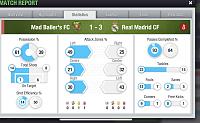i always attend my games when possible, but somehow this game engine can punish you for the simple fact you are attending your game, and the opposing manager is not, never mind having a fully rested team, suberb morale, 40% bonus, playing at home with a full stadium, etc. I just lost at home against a direct rival for top 4, player for player my team is better, with the exception of a mutant or 2 for the other team. Story of the game, 4 mins in ,the game was decided by the game engine, straight red for my midfielder, penalty for my opponent, of course he scores, i equalize moments after, but the game as usual screws me over, my players proceed to miss chance after chance, and the opponent scores 2 more to kill the game. I’m done with this scripted trash



 3Likes
3Likes LinkBack URL
LinkBack URL About LinkBacks
About LinkBacks

 Reply With Quote
Reply With Quote

